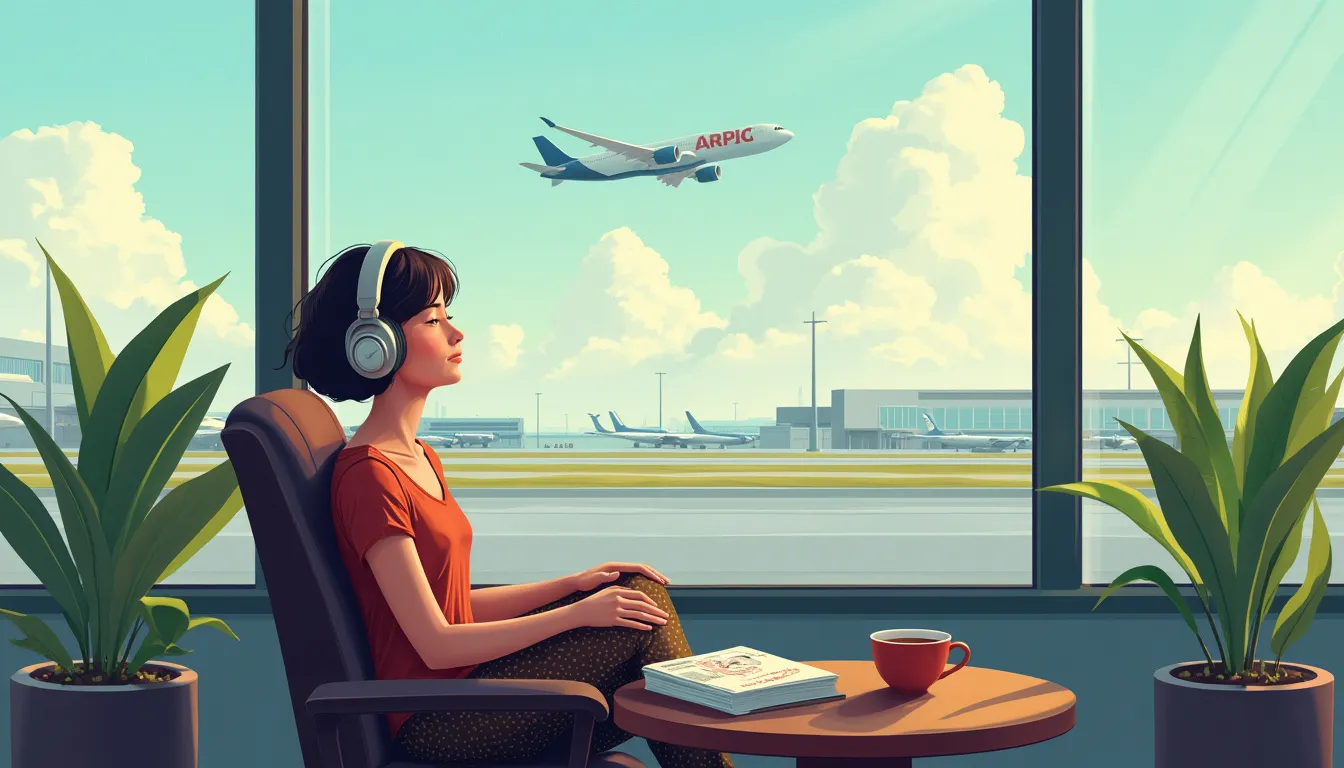If the mere thought of boarding an airplane sends your heart racing and palms sweating, you’re not alone. Flight anxiety, a common yet distressing issue, affects millions of travelers each year. Luckily, there are effective ways to manage and overcome this form of anxiety, making your journey more enjoyable and stress-free. In this comprehensive guide, we’ll delve into what flight anxiety is, the symptoms and causes behind it, and most importantly, proven flight anxiety tips that can help you stay calm and composed during your travels. From meticulous preparation to relaxation techniques, we’re here to guide you every step of the way, ensuring you can conquer your fears and take to the skies with confidence.
Understanding Flight Anxiety
What is Flight Anxiety?
Flight anxiety, also known as aviophobia, is a common psychological condition characterized by an intense fear or apprehension of flying. This type of anxiety can range from mild unease to a paralyzing fear that prevents individuals from boarding an aircraft. Flight anxiety is not limited to commercial flights; it can occur in any situation involving air travel, including private or military flights.
Individuals suffering from flight anxiety often experience it well before the actual flight, sometimes days or weeks in advance. This anticipation can affect not only their mental well-being but also their daily activities. Recognizing and understanding the nature of flight anxiety is the first step toward managing and overcoming it.
Common Symptoms and Causes of Flight Anxiety
There are a variety of symptoms associated with flight anxiety, which can manifest both physically and mentally:
- Increased heart rate
- Sweating
- Shaking or trembling
- Nausea or stomach discomfort
- Shortness of breath
- Feelings of panic or dread
- Negative thoughts or catastrophic thinking
- Difficulty concentrating
Understanding the causes behind flight anxiety can help in addressing the fear more effectively. Several factors contribute to this form of anxiety:
Fear of Heights
Many people have an inherent fear of heights (acrophobia), which can be amplified when they are thousands of feet above the ground in an airplane.
Lack of Control
Being in an airplane means entrusting one’s safety to the pilot and the aircraft’s engineering, leading to a perceived loss of control, which can trigger anxiety.
Turbulence
Experiencing turbulence can cause significant distress, as the unpredictable movements can make passengers feel unsafe.
Claustrophobia
The confined space within an airplane cabin can lead to discomfort and a sense of being trapped, contributing to heightened anxiety levels.
Past Negative Experiences
A previous traumatic event related to flying or news of aviation accidents can create a lingering fear.
General Anxiety Disorder (GAD)
Individuals with a predisposition to anxiety disorders might be more prone to developing flight anxiety due to their overall heightened sensitivity to stress.
Media Influence
Dramatized portrayals of air travel disasters in movies and on television can exaggerate fears and create misconceptions about the safety of flying.
Fear of Terrorism
Concerns about terrorist attacks can intensify flight anxiety, particularly for those who are already uneasy about flying.
Unknown Environments
Airports and airplanes are unfamiliar settings for many people, and navigating them can be overwhelming, especially for first-time flyers.
Recognizing these symptoms and understanding their triggers can pave the way for effective flight anxiety tips and strategies. The mind and body both play crucial roles in how flight anxiety is experienced, making a multifaceted approach necessary for overcoming it.
Discover more travel tips and insights on our blog.

Effective Tips to Overcome Flight Anxiety
Prepare Ahead of Time
Plan Your Itinerary and Arrive Early
Anxiety often stems from uncertainty and feeling rushed. One of the most crucial flight anxiety tips is to plan your itinerary thoroughly. Research your flight details including departure and arrival times, as well as the layout of the airport. This preparation can offer a sense of control and reduce anxiety.
Arriving at the airport early is another essential tip. It gives you ample time for check-in, security screening, and reaching your gate. When you’re not in a rush, you have time to acclimate to your surroundings, which can substantially minimize anxiety levels. Creating a buffer by arriving early also allows you to address any unforeseen issues calmly, without increasing stress levels, and ultimately makes you feel more in control of the situation.
Pack Comfort Items and Entertainment
Another useful flight anxiety tip is to pack items that can provide comfort and distraction. Bring along items that help you feel secure, such as a comfortable travel pillow, a cozy blanket, or a favorite item from home. The sense of comfort can act as a buffer against anxiety triggers during the flight.
Entertainment can be a great distraction from anxiety. Make sure to pack a variety of entertainment options such as books, magazines, podcasts, and movies. Having multiple options allows you to switch between activities, keeping your mind engaged and less focused on anxiety. Download your favorite playlist, movie, or a new book before your journey begins to ensure you have plenty of in-flight distractions.
Relaxation Techniques
Breathing Exercises and Meditation
When we’re anxious, our breathing often becomes shallow and rapid, exacerbating feelings of panic. Implementing breathing exercises can be a highly effective flight anxiety tip. Deep breathing techniques can help to activate the body’s relaxation response. Try practicing methods like the 4-7-8 technique where you inhale for four seconds, hold your breath for seven seconds, and exhale for eight seconds. This method helps to regulate your heartbeat and induce a state of calm.
Meditation is another excellent tool for managing flight anxiety. Apps such as Headspace or Calm offer guided meditations specifically designed for travel anxiety. Even a short, five-minute meditation session can significantly lower stress levels and provide a feeling of control over your anxiety.
Listening to Music or Guided Relaxation Apps
One of the simplest yet most effective flight anxiety tips is to listen to music. Create a calming playlist before your trip, filled with your favorite soothing songs. Listening to familiar tunes can reduce stress and divert your focus away from anxiety. Classical music, in particular, has been found to lower heart rates and reduce levels of the stress hormone cortisol.
Guided relaxation apps also offer a range of features designed to help you relax. Many of these apps provide guided visualizations, progressive muscle relaxation techniques, and calming sounds like nature tracks. For example, the app Insight Timer has thousands of free guided meditations and soundtracks aimed at relaxation and stress relief. Utilizing these resources can transform your in-flight experience, making it much more manageable.
In conclusion, flight anxiety is a common and natural response for many travelers, but with the right strategies, it can be effectively managed. Understanding what flight anxiety is and recognizing its symptoms and causes are the first steps toward addressing this challenge. Armed with this knowledge, you can take proactive measures to ease your anxiety and ensure a smoother travel experience.
By preparing ahead of time, you can significantly reduce stress. Planning your itinerary meticulously and arriving at the airport early can help you avoid the rush and chaos that often exacerbates anxiety. Bringing along comfort items, such as a favorite blanket or pillow, and entertainment options like books or movies, can provide a sense of familiarity and distraction during the flight.
Incorporating relaxation techniques into your routine can also be highly beneficial. Practicing breathing exercises and meditation can help calm your nerves and maintain a steady, relaxed state of mind. Listening to music or using guided relaxation apps can further enhance this process, providing soothing audio cues to help keep your anxiety in check.
Ultimately, these flight anxiety tips are designed to empower you to take control of your fear of flying and transform your travel experience. While it may take some time and practice, implementing these strategies can lead to more pleasant and stress-free journeys. Embrace these techniques, and you might find yourself not only managing your flight anxiety but also enjoying the adventure that flying can offer.







